Stress cardiomyopathy: A temporary heart condition often triggered by physical or emotional stress, such as surgery
Introduction
In the realm of heart health, stress cardiomyopathy, also known as Takotsubo cardiomyopathy or "broken heart syndrome," stands out as a fascinating yet potentially serious condition. This temporary heart condition can mimic the symptoms of a heart attack and is often triggered by physical or emotional stressors, such as surgery, severe illness, or intense emotional experiences. Despite its transient nature, stress cardiomyopathy can have significant implications for patient care and outcomes, making it a topic of great interest and study in the medical community.

What is Stress Cardiomyopathy?
Stress cardiomyopathy is a condition characterized by a sudden and temporary weakening of the heart muscle. This weakening can lead to symptoms that mimic those of a heart attack, such as chest pain, shortness of breath, and irregular heart rhythms. Unlike a heart attack, which is caused by a blockage in a coronary artery, stress cardiomyopathy is not related to coronary artery disease. Instead, it is believed to be triggered by a surge of stress hormones, such as adrenaline, which can temporarily stun the heart muscle.
Understanding the Name: Takotsubo Cardiomyopathy
The name "Takotsubo" comes from the Japanese word for an octopus trap, which has a shape resembling the affected heart in this condition. The left ventricle of the heart balloons out, creating a shape similar to the round bottom of the trap. This distinctive shape is often seen on imaging tests, such as echocardiograms or cardiac MRI scans, and is a key diagnostic feature of stress cardiomyopathy.
Triggers of Stress Cardiomyopathy
Stress cardiomyopathy can be triggered by a variety of physical and emotional stressors. Some common triggers include:
- Severe illness or injury
- Surgery
- Intense emotional experiences, such as grief, fear, or anger
- Natural disasters or traumatic events
- Use of certain medications or drugs
It's important to note that not everyone who experiences a stressful event will develop stress cardiomyopathy. The exact reasons why some individuals are more susceptible than others are not fully understood and are an active area of research.
Symptoms of Stress Cardiomyopathy
The symptoms of stress cardiomyopathy can vary widely from person to person and can mimic those of a heart attack. Common symptoms include:
- Chest pain or discomfort
- Shortness of breath
- Irregular heart rhythms
- Fatigue
- Nausea or vomiting
- Sweating
It's important to seek medical attention if you experience any of these symptoms, as they can also be signs of a heart attack or other serious condition.
Diagnosis of Stress Cardiomyopathy
Diagnosing stress cardiomyopathy typically involves a combination of medical history, physical examination, and diagnostic tests. Your doctor may order tests such as an electrocardiogram (ECG), echocardiogram, or cardiac MRI to assess the structure and function of your heart. Blood tests may also be done to rule out other possible causes of your symptoms.
Treatment and Prognosis
The treatment for stress cardiomyopathy is focused on managing symptoms and supporting the heart as it recovers. In most cases, the condition resolves on its own within a few weeks to months, and the heart muscle returns to normal function. However, in some cases, complications such as heart failure or irregular heart rhythms can occur and may require additional treatment.
Prevention and Lifestyle Considerations
While stress cardiomyopathy cannot always be prevented, there are steps you can take to reduce your risk. Managing stress through techniques such as meditation, yoga, or counseling may be helpful. Additionally, maintaining a healthy lifestyle with regular exercise, a balanced diet, and avoiding tobacco and excessive alcohol use can support heart health.
Conclusion
Stress cardiomyopathy is a unique and often misunderstood condition that can have serious implications for those affected. By understanding its causes, symptoms, and treatment options, individuals can be better prepared to recognize and manage this condition. As research continues to uncover more about the underlying mechanisms of stress cardiomyopathy, there is hope for improved prevention and treatment strategies in the future.
| Older Post | Home | Newer Post |





